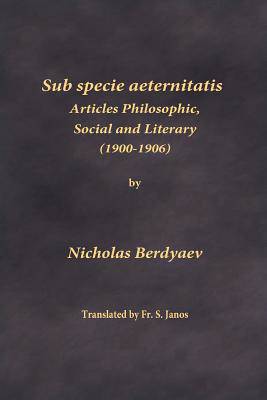
- Retrait gratuit dans votre magasin Club
- 7.000.000 titres dans notre catalogue
- Payer en toute sécurité
- Toujours un magasin près de chez vous
- Retrait gratuit dans votre magasin Club
- 7.000.0000 titres dans notre catalogue
- Payer en toute sécurité
- Toujours un magasin près de chez vous
Sub specie aeternitatis
Articles Philosophic, Social and Literary (1900-1906)
Nicholas BerdyaevDescription
1st English translation from Russian: the Russian religious philosopher Nicholas Berdyaev's 1907 book, "Sub specie aeternitatis: Articles Philosophic, Social and Literary (1900-1906)", is a sbornik collection 1900-1906 journal articles penned by him. It is among the earliest of his books, and as such serves as key to elements in his thought in this early period. Berdyaev's fundamental motifs of freedom, the person, creativity, spirit -- are already quite evident, and further advanced by his rediscovery research into the thought of significant often obscure thinkers, both Russian and foreign. Berdyaev in a number of his books similarly recycled previously published journal articles; "Sub specie aeternitatis" is however untypical in that the selection of articles is arranged chronological, rather than seemingly randomly. Historical understanding of the time is also helpful: turn of the century Russia, its defeat in the 1904-5 Russo-Japanese War, "Bloody Sunday" (22 January 1905), the failed 1905 "Russian Revolution" and the reactionary aftermath from its excesses. And against this setting there is also the intellectual and cultural setting. Berdyaev's 1907 book addresses an array of subjects. In this, he is part of a larger movement of creative minds having forsaken the dictates of crude materialism in favour of Philosophic Idealism, and its implications. There are profound critiques of positivist Rationalism and the German Neo-Kantianism (Rickert, Cohen, Windelband), and the need for ontological realism in place of ungrounded gnosseology. Several articles deal with Marxism and its descent into a totalitarian pseudo-religion governing all aspects of life. In another, we gain Berdyaev's insights on the unprecedented Intelligentsia-Church "Peterburg Religio-Philosophic Gatherings" at the turn of the century. There are studies of significant forgotten figures from the past, such as Khomyakov and Leont'ev -- each of whom Berdyaev will later write a book. Other profound figures. "Tragedy" as regards Nietzsche and an insightful view into the dramatic works of Maurice Maeterlinck. The L. Shestov article involving tragedy echoes the existentialist angst in man's condition, the tragedy of the concrete human person. Some of the articles relate to Russian issues of the time, and yet others remain timeless in their relation to our modern situation today -- cultural, political, social, intellectual, indeed spiritual, in search for valid groundings to the meaning in life, in more than hollow slogans. Berdyaev's Latin title, "Sub specie aeternitatis", might perhaps be loosely translated in context as -- "With an eye towards the aspect of eternity", -- and that for everyone caught up in the grueling quest for one's "daily bread", that even in the uncommon instances of a surfeit of "daily bread", there mustneeds be something more, to "life"... This is the first appearance of Berdyaev's 1907 book, "Sub specie aeternitatis", in English translation. It represents yet another hitherto unavailable work within the continuing series of our efforts at translation of neglected primary texts in Russian Religious Philosophy, under the imprint of "frsj Publications".
Spécifications
Parties prenantes
- Auteur(s) :
- Editeur:
Contenu
- Nombre de pages :
- 472
- Langue:
- Anglais
Caractéristiques
- EAN:
- 9780999197936
- Date de parution :
- 24-03-19
- Format:
- Livre broché
- Format numérique:
- Trade paperback (VS)
- Dimensions :
- 152 mm x 229 mm
- Poids :
- 625 g







